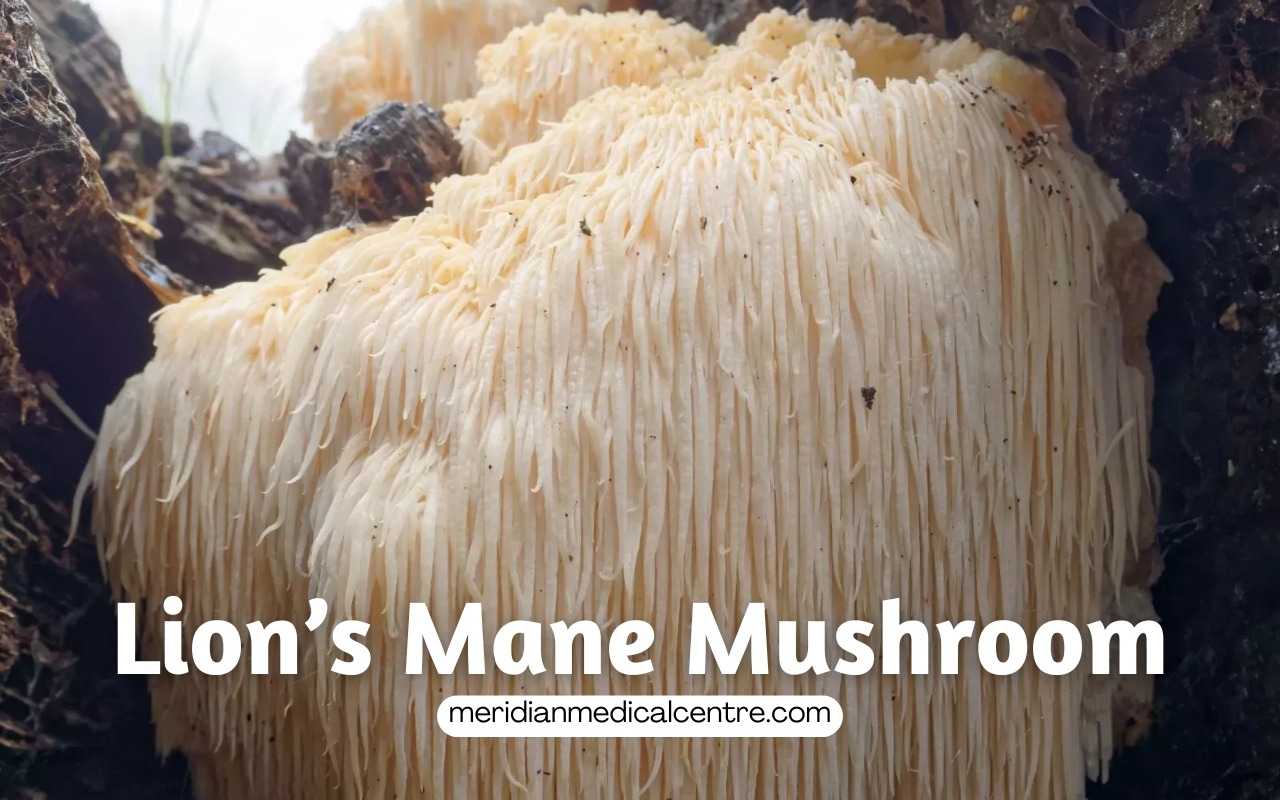
Meridian Medical Centre provides evidence-based, informative content on natural wellness approaches that complement clinical care. Our focus is on empowering individuals to make informed health choices, with content rooted in scientific research and professional expertise. While we recognize the role of holistic health solutions, we emphasize the importance of consulting healthcare professionals for personalized medical guidance. Our approach is ethical, transparent, and accessible, ensuring that readers receive trustworthy health information that integrates natural and clinical solutions for better health outcomes.
Understanding Lion's Mane Mushroom
Lion’s Mane (Hericium erinaceus) is a medicinal mushroom known for its neuroprotective properties. Traditionally used in Chinese and Japanese medicine, modern research has confirmed its potential benefits for brain function, cognition, and memory.
Lion’s Mane is recognizable by its white, pom-pom-like structure and grows on hardwood trees. It is widely consumed in food and supplement forms, including powders, capsules, and liquid extracts. Rich in vitamins (thiamine, riboflavin, niacin) and essential minerals (manganese, zinc, potassium), Lion’s Mane has gained recognition for its role in neurological health and cognitive function.
Clinical Evidence on Lion’s Mane and Brain Function
1. Neuroprotection and Cognitive Enhancement
Lion’s Mane contains hericenones and erinacines, bioactive compounds that stimulate Nerve Growth Factor (NGF), which is essential for neuronal survival, regeneration, and synaptic plasticity.
Key Studies:
- A 2020 study found that hericenones and erinacines enhanced NGF production, supporting neurogenesis and neuronal repair.
- A 2019 clinical trial demonstrated that older adults with mild cognitive impairment (MCI) who took Lion’s Mane extract for 16 weeks experienced improved memory recall and cognitive performance.
- A 2018 review concluded that Lion’s Mane may reduce cognitive decline by modulating neuroinflammation and oxidative stress.
2. Potential Role in Neurodegenerative Diseases
Lion’s Mane may help slow Alzheimer’s and Parkinson’s disease progression by reducing amyloid-beta plaque accumulation and oxidative stress.
Key Findings:
- Animal studies suggest that Lion’s Mane extract reduces amyloid-beta plaques, a hallmark of Alzheimer’s disease pathology.
- Preclinical studies indicate that Lion’s Mane may protect dopaminergic neurons, which are affected in Parkinson’s disease.
3. Effects on Mood and Anxiety
Lion’s Mane has demonstrated antidepressant and anxiolytic effects by modulating NGF and neuroplasticity.
Clinical Evidence:
- A 2010 Japanese study found that women who consumed Lion’s Mane-infused cookies for four weeks reported reduced anxiety and depression symptoms.
- Animal studies suggest that erinacines influence serotonin and dopamine levels, two neurotransmitters essential for mood regulation.
4. Nerve Regeneration and Stroke Recovery
Lion’s Mane has shown promise in nerve repair, making it a potential candidate for stroke recovery, spinal cord injuries, and nerve damage.
Notable Studies:
- Research suggests that Lion’s Mane extract enhances motor function recovery post-stroke.
- Animal models show increased nerve regrowth in cases of peripheral nerve injury.
How to Incorporate Lion’s Mane into Your Routine
Forms and Dosage
Available Forms:
- Powder (added to coffee, tea, or smoothies)
- Capsules
- Liquid extracts
Recommended Dosage:
- Cognitive support: 500 mg – 1,000 mg daily
- Neurodegenerative support: Up to 3,000 mg daily
- Mood support: 1,000 mg – 2,000 mg daily
Optimal Usage Tips
- Pair with black pepper or healthy fats for better absorption.
- Use consistently for 8-12 weeks to maximize cognitive benefits.
- Choose fruiting body extracts for a higher concentration of bioactive compounds.
Potential Side Effects and Safety Considerations
While generally safe, possible side effects include:
- Mild gastrointestinal discomfort
- Allergic reactions (particularly in those with mushroom allergies)
- Potential interactions with blood thinners
Precautions:
- Consult a healthcare professional before use.
- Avoid before surgery due to potential anticoagulant properties.
- Pregnant and breastfeeding women should seek medical guidance before use.
Conclusion: The Future of Lion’s Mane in Cognitive Health
Scientific research supports Lion’s Mane for cognitive enhancement, neurodegenerative disease management, and nerve regeneration. While human trials continue to confirm its benefits, the evidence suggests that Lion’s Mane is a promising natural supplement for brain health.
At Meridian Medical Centre, we emphasize evidence-based wellness solutions. Lion’s Mane remains a compelling option for neuroprotection and cognitive function, offering a safe, scientifically backed alternative for individuals seeking brain health support.
For personalized recommendations, consult a qualified medical professional before starting any new supplement regimen.